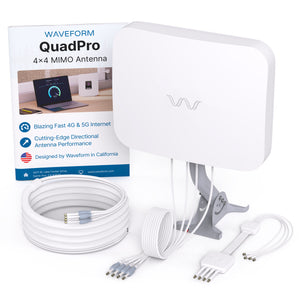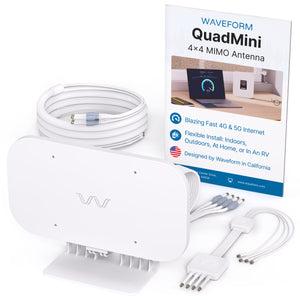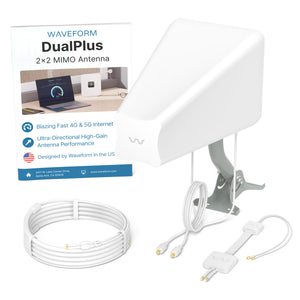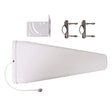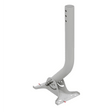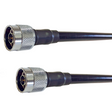The merger between Sprint & T-Mobile has been a point of interest in the wireless industry since the $26 billion merger was announced in late April, 2018.
The FCC is currently collecting comments as part of its regulatory role in approving the merger. If approved by the FCC and the Justice Department, the merger would reshape the wireless industry. The combined T-Mobile and Sprint would result in a company with over 90 million customers, immediately putting it neck-and-neck with AT&T for the position of second largest carrier.
A little over 300 comments have been filed thus far with the FCC on the proposed merger. But we wanted to dig deeper and understand exactly how customers of each network feel about the merger.
About Waveform:
Founded in 2010, Waveform is a leading online reseller of cell phone signal boosters, small cells, and a systems integrator of in-building active and passive distributed antenna systems. The company has worked with over 20,000 customers to improve cell service in buildings of all sizes.
Survey Methodology:
Waveform conducted an online survey of 1,048 American adults between September 4th and September 5th on SurveyMonkey to better understand consumer opinions about the merger. The results reflect a nationally representative sample, with a of confidence interval of 3%. More information about SurveyMonkey’s online survey methodology is available here.
Survey Highlights
- Consumers generally approve of the merger:
67.2% majority of respondents believe government regulators should approve the Sprint-T-Mobile merger.
- T-Mobile subscribers are the strongest proponents of the merger:
74.3% think the merger should be approved.
- T-Mobile subscribers also believe they stand to lose the most:
19.2% of those surveyed believe their service will degrade as a result of the merger, while 44% believed it would improve.
- Sprint customers feel that they stand to gain the most:
A 54.2% majority feel that their service will improve if a merger goes ahead.
- AT&T stands to lose the most from a proposed merger:
AT&T customers were the most interested in switching to a combined Sprint and T-Mobile. 36.0% of respondents were interested in switching to the merged carrier.
T-Mobile and Verizon Lead in Customer Satisfaction
To get started, we asked people how satisfied they are with their service to lay some groundwork. We found that T-Mobile and Verizon lead in customer satisfaction. While the raw numbers show a slight edge for T-Mobile, they are virtually tied given the 3% confidence interval.

- T-Mobile - 95.1% of customers polled were satisfied or very satisfied.
- Verizon - 93.1% of customers polled were satisfied or very satisfied.
- AT&T - 91.8% of customers polled were satisfied or very satisfied.
- Sprint - 80.9% of customers polled were satisfied or very satisfied.
The results here closely align with JD Power’s 2018 report on customer service satisfaction amongst cellular carriers, as well as YouGov’s customer satisfaction survey.
Interestingly, these results closely mirror studies performed on network performance. For example, recent reports by OpenSignal and Ookla that showed T-Mobile leading the industry in network performance, followed closely by Verizon.
Almost every household has a scrambled Rubik's Cube that has never ever been solved. Use the online Rubix Cube solver to get it fixed in less than 25 steps!
Consumers Think Government Should Approve Sprint-T-Mobile Merger
Our poll showed wide support amongst consumers for approval of the merger. 67.2% of respondents thought that the government “definitely should” or “probably should” approve the merger.

Breaking out these results by carrier showed clear divisions amongst subscribers of different carriers:

T-Mobile subscribers showed the strongest support for approving for the merger, with 74.3% of survey respondents in favor of the merger. AT&T and Verizon subscribers demonstrated the lowest support for the merger, though a majority of subscribers of both carriers still support the proposed merger.
Perceived effects of the proposed merger on cell service
A plurality of survey respondents from every carrier believe that the merger would either make service better for Sprint and T-Mobile customers or have no effect.
However, T-Mobile subscribers were most likely to think that service would degrade, while Sprint subscribers were most likely to think that service would improve.

These results makes sense: Sprint has the weakest network in the US, while T-Mobile has one of the best. T-Mobile’s CEO, Neville Ray, has made it clear that T-Mobile would be the “anchor network” if a merger were approved, and Sprint users would be migrated across to the new network while the spectrum assets of the combined company were merged into one network.
Which carrier stand to lose the most from the proposed merger?
One of the biggest questions about the merger is how it would restructure the shape of the US wireless market. And, in particular, how many current AT&T and Verizon subscribers would be likely to switch to the newly formed carrier?

The results of this question should be a cause for concern for AT&T, and a huge opportunity for “New T-Mobile.” 12.3% of AT&T subscribers were “extremely” or “very” interested in switching to a combined T-Mobile-Sprint.
Extrapolating to AT&T’s current subscriber base of 93 million, the 12.3% figure translates to around 11.4 million subscribers. It’s clear that the biggest loser from a Sprint and T-Mobile merger is likely to be AT&T.
Verizon users were less interested in switching. Only 6.3% said they were “very” or “extremely” interested in switching.
Interest in “Fixed 5G” home broadband service from cellular carriers
5G promises lower latencies and faster throughputs than 4G LTE networks. On potential use of the faster connectivity is using it to deliver wireless “last-mile” broadband Internet connectivity and challenging traditional home broadband players.
Verizon is planning on trialing fixed 5G home broadband in three to five cities by the end of this year. T-Mobile has also said that it is potentially interested in launching a fixed 5G service to homes and business if the Sprint merger goes ahead. Of the three biggest carriers, AT&T alone has not expressed any appetite for using fixed wireless 5G for last-mile broadband.
We wanted to know how customers feel about buying home broadband from their cell carriers. The results were promising for carriers.

AT&T and T-Mobile subscribers were the most interested in home broadband from their carrier. This is particularly promising for T-Mobile if they decide to move ahead with their plans.
Verizon subscribers showed the least interest in using a newly launched home broadband service from their carrier.
Further reading
The following is a list of our most popular content:
Guides























